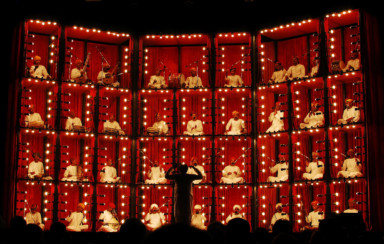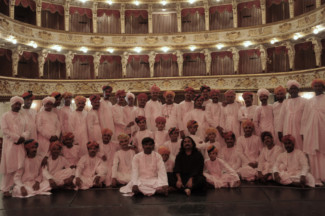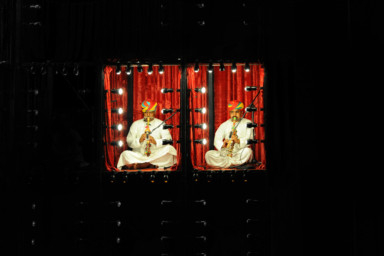
“I wept for joy,” says the visibly emotional 72-year-old former principal of Delhi Public School, June Fernandez, after watching “The Manganiyar Seduction” directed by well-known theatre director Roysten Abel in Bangalore last month. She wasn’t the only one; there was Jawaid Danish, Canadian playwright of Indian origin, in the audience explaining what he called music of “loving and healing” to his friends. On that full moon night, the audience, comprising the cream of Bangalore’s high society, found new spiritual energy as 43 Manganiyar musicians seduced the souls of nearly everyone that watched them. Tearfully ecstatic, the audience jumped for joy and broke into a thunderous applause at every given opportunity leading to the crescendo with the haunting melody of Sufi saint Bulleshah’s “Alfat Un Bin In Bin”, which gave way to a standing ovation that lasted a long, long time. And, that was only Bangalore.
“The Manganiyar Seduction”, conceived and directed by Abel, has, in the past seven years, performed and charmed audiences across the world; the “seduced” include some very high-profile names. Academy award-winning actor Geoffrey Rush, who watched the show in Melbourne about a year ago, was so captivated that he presented Abel with a handwritten note. “I was seduced! I felt boundless joy. My mind was dancing in the outer edges of the expanding universe. My heart was humming in the deep centre of an atom. Bless you and your magical, Muslim mind-bending musicians, maestro,” reads Rush’s ecstatic note. Another big star who was charmed by the Manganiyars was legendary vocalist and flautist Peter Gabriel who heard them at Womad in the UK last year. “When Peter Gabriel said he liked the show, I become like a stuttering school boy. I wanted to tell him he was my hero and that I had grown up listening to him, but I was so shy I couldn’t say anything,” reminisces Abel.
It can be a little overwhelming, this international adulation — concerts at the most splendid locales around the globe and shows alongside the biggest superstars in the performance world. Abel, however, says that the musicians remain untouched by the fame and glory. “The Manganiyars are a very simple people, they love their music, are spiritual in the most beautiful way, and fortunately not swayed by any of this adulation or success.” While the Manganiyars remain unchanged, Abel feels that his meeting with the Manganiyars was a life-changing event for him. He recalls his first encounter with two of the musicians, Mame Khan and Deu Khan in 2006. “I had directed a show called ‘Jiyo’ with out-of-work musicians, magicians, snake charmers, impersonators and street performers. We were in Segovia, Spain, and I was being regaled by their music; they sang until I went to sleep and then woke me up with their beautiful songs, every single day. They followed me across the city, into restaurants, into other public and not-so-public spaces. They were oblivious to the decorum of the space and sang from the heart, all the time and everywhere. In two weeks I could feel a physiological change in my being though I couldn’t quite put my finger on it. I knew I was totally seduced,” he says. Once he came back to India, he was sure that he wanted to create a show with their music. “I wanted to do something theatrical and contemporary, and yet retain the flavour of their music. They were fantastic musicians — I wanted them to be presented like Jewels in a crown, and thus began the collaboration on ‘The Manganiyar Seduction’.”
The Manganiyars and their music changed the way Abel perceived theatre, music and even life. So much so, that today, seven years later he — a native of Kerala who has lived in Delhi for over 20 years — is looking forward to creating an Artists’ Centre in Jaisalmer, the home of the Manganiyars. “I want to live the remaining years of my life in their midst, surrounded by their music. In a world that is falling apart all around us, the Manganiyars, I feel, are the only people who have retained their humanity, simplicity and spiritual way of life,” the 45-year-old Abel says.
The Manganiyars are a caste of Muslim musicians, best known for their classical folksy ballads. Patronised earlier by kings and later by feudal landlords they have special songs for births, weddings, celebrations and mourning — a song for every occasion. They even have songs about Alexander’s conquest of India. Most songs, though, celebrate love. They are unique in the sense that although they practise Islam they also embrace Hindu deities and are known to sing Hindu devotional songs. Even though they are considered folk musicians, their work clearly encompasses the genre of Hindustani classical music. Unlike highly refined classical music, the Manganiyars have managed to retain the unpolished edge to their voices. Their music is straight from the heart and the melodies transcend cultures, borders and nations. This explains their popularity across the world, be it China, New York, Dubai or Vienna.
Their music is passed on from generation to generation and in places such as Jaisalmer, music is a way of life; you will find a 7-year-old singing like a pro along with his grandfather, or playing the dholak or the kartal. Most musicians are vocalists who also multitask by playing complicated instruments. When you take a group of traditional musicians rooted in culture around the world, you risk several things, including contamination, not just of their music, but also their way of life, something Abel is very aware of.
“This is not a regular show, in the sense, I’m not a director and these are not my actors. This is a collaboration between a theatre director and a big group of musicians. Together we have set the rules for our shows. They prefer to travel with their own team of cooks, so that they can have the food they are used to, no matter where they travel. We have gradually come to understand each other better — it’s a relationship built over time and love, not just over our shows,” says Abel, who also maintains that their way of life largely remains unchanged.
“Yes, some of them now have pucca [concrete] houses, and a few senior musicians even have jeeps, but that’s about it. The Manganiyars live differently from us — what they have belongs to the whole community, even to visitors. If you go to their house, they will give you the best blanket, the last morsel of food they have. It is a very humbling experience being in their presence.”
Today, the Manganiyar musicians — like all traditional artists — are a dying breed. Poverty, water scarcity — vessels are washed with sand to conserve water in the desert — and marginalisation have forced hundreds to the cities in search of labour, while others are forced to give up their lands in search of a better livelihood. Thanks to several initiatives by arts organisations in India, though, there has been an resurgence in interest in the music of the Manganiyars, not just in India but internationally. Ariane Mnouchkine, renowned director of Theatre du Soleil, has worked with them. Rhythms of Rajasthan is another Manganiyar-music-led show that has been travelling extensively. And then there is the mother of all music festivals, the Rajasthan International Folk Festival, held annually in the desert. “The Manganiyar Seduction” is still the most popular show of them all, taking the music of the Manganiyars to the biggest events in the world.
In the last seven years the Manganiyars have become so popular in the world music scene that audiences outside India think of the Manganiyars and Pandit Ravi Shankar as the only representatives of Indian music (not counting Bollywood of course), but back home they are relegated to the category of “folk” musicians, with Bollywood ripping off most of their music and turning them into chartbusters without even token payments or acknowledgements. In 2012 they performed at Womad in the UK, The Penang International Arts Festival and at the Royal Opera House in Muscat and the year before, at Womad in Abu Dhabi and in Paris, Dusseldorf, Melbourne and Hong Kong. They opened this year with a performance in Bangalore for the Attakkalari Biennial, and in a few months they will touring the United States. “Of the 50 people in our team, there are 38 Khans. All but one of my musicians are Muslim — can you imagine the nightmare of a US visa?” laughs Abel, referring to the impending visit to the US Embassy.
After every performance, once Bulleshah’s mystical harmony reaches a rousing crescendo with all 36 musicians singing and playing together, when all of Abel’s lights flash across the sets crazily, mirroring the state of the audience, on a high from the music, Abel comes up on stage and introduces each and every musician. The lone Hindu in the team of the Manganiyars, Deu Ram, then proceeds to lead the entire group in a gentle “Meera Bhajan”. The Manganiyars join in and what started with the gently healing touch of Sufi mysticism comes full circle, ending on a tender, magical note. Not surprisingly the standing ovation included a joyful, weeping audience as the smiling musicians completed their show and climbed out of their perches.
Nirmala Ravindran is a writer based in Bengaluru, India.




